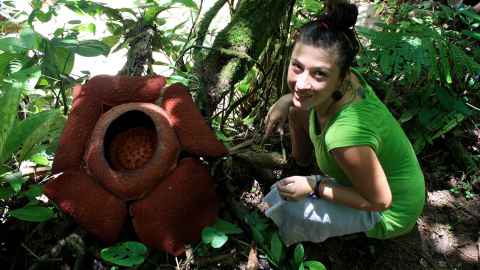Maria Charry
Maria completed her PhD, receiving her doctorate in 2019. She now works as a science adviser to the Parliamentary Commissioner for the Environment, otherwise known as the Environment watchdog.

“My research focussed on ecotoxicology, characterising the effects of chemical stressors in estuaries using copepod bioassays.
“I was inspired to pursue a qualification in this area while working in Wellington where I was monitoring pollution in coastal areas and noticed the lack of guideline values for some chemicals. This was very frustrating because it meant we didn’t know if the concentrations of chemicals detected in the environment were high enough to trigger harm to species living in them. So I set my mind to wanting to develop some sort of tool to help identify the impact of chemicals on coastal organisms.
The programme gave me a taste for what it is like to work in a real research institute. I also loved the sparkling clean laboratories at Cawthron, with all the latest technology to learn about. I feel it gave me a bit of a head start.
“Carrying out my research at Cawthron was an interesting experience in two different ways. Firstly, it was inspiring to be surrounded by scientists working on real life issues and using innovative methods to find solutions. Secondly, Cawthron is a place where you can expand your professional network at an early stage of your research, and get to learn more about other projects, which has become handy in my current role. “The programme gave me a taste for what it is like to work in a real research institute. I also loved the sparkling clean laboratories at Cawthron, with all the latest technology to learn about. I feel it gave me a bit of a head start.
“The experience set me up on a great path! After completing my studies, I became a science adviser to the Parliamentary Commissioner for the Environment, otherwise known as the Environment watchdog. As an adviser, I keep the Commissioner updated on matters related to chemicals, contaminants, and hazardous waste in New Zealand, and conduct investigations on different environment issues. I also participate in a range of discussions with researchers, local and national agencies, and industries, mainly on topics related to toxicants and their impact to our environment. This experience has led me to understand how science is considered and applied by policy makers in the regularity system.
“During my study, I was fortunate to have the mentoring and financial support of Boffa Miskell, which was essential for landing a Callaghan Innovation R&D Student Fellowship Grant. The grant covered all you need as a student– annual fees, living stipend and research funding.
“Because I was based outside of Auckland, I wasn’t able to take advantage of all the services the Uni offers its students. However, I did go on a 3-day writing retreat for PhD students that was organised by my faculty. This was great for focusing and writing my thesis. It also gave me the opportunity to meet other people going through the same process, which was great.
“My advice to anyone considering completing their postgraduate study at a Joint Graduate School — if the opportunity is there, use it! I think it is good to know that the environment at research institutes can be a bit different to that from universities, and you need to be autonomous. However, if you are struggling with something – as we all do at some point – don’t be afraid to ask. Take advantage of being surrounded by experts! If they don’t know, they will surely know of someone else that can help. And the friendships you build with fellow graduate students and researchers will take you all the way to the end.”